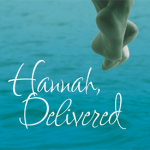Delivering Hannah
 I don’t understand how anyone, myself included, can create a dynamic story. Stories have a life all their own—their own wisdom, their own flaws, their own power. Today is launch day for Hannah, Delivered, and to celebrate I want to kneel down before the mystery that is story.
I don’t understand how anyone, myself included, can create a dynamic story. Stories have a life all their own—their own wisdom, their own flaws, their own power. Today is launch day for Hannah, Delivered, and to celebrate I want to kneel down before the mystery that is story.
As you can imagine, I’ve been riding an emotional rollercoaster as I prepare to put a decade’s worth of effort into the public eye. One reader weeps, she’s so moved by the novel, and I’m elated. Another reader is furious about a mistake in the book, and I feel miserable. And so it goes, up and down, until I’m driving my family berserk.
When I’m having labor pains like this, my partner Emily sometimes asks me, “What would Hannah do?” The question makes me laugh, but it’s right on. Really she’s saying, “Consult something other than your mercurial feelings. What does the story say?”
Going Virtual, Staying Real
 In case you’re wondering, I’m writing this (at least the first draft) by hand, in a spiral notebook with a fountain pen. My laptop makes a great lap desk. I like the new paper against the back of my hand and the ink easing from my pen tip. Writing can be a calming, sensory delight.
In case you’re wondering, I’m writing this (at least the first draft) by hand, in a spiral notebook with a fountain pen. My laptop makes a great lap desk. I like the new paper against the back of my hand and the ink easing from my pen tip. Writing can be a calming, sensory delight.
These days I’m spending more of my day than ever before on the computer—on the internet, even, where privacy doesn’t exist and stimulation is the rule.
Penny Friend
 Annie, my neighbor one block over, bends down to the curved rut running the length of the alley and scrapes a penny out of the sand. She brushes its scratched surface against her blue-jeans, then presses it into my palm. “You’re the lucky one today,” she says.
Annie, my neighbor one block over, bends down to the curved rut running the length of the alley and scrapes a penny out of the sand. She brushes its scratched surface against her blue-jeans, then presses it into my palm. “You’re the lucky one today,” she says.
I slip the rough penny into my pants’ pocket, laughing at our odd ritual. It’s not strange that Annie bothers to pick up a penny; she is Buddhist and a poet, a woman who treasures details and is as frugal with resources as she is with words. Even one cent, tarnished and of little value, gains significance by our attention.
Church: The Third Parent
I regularly dream about the church where I grew up: A soaring Protestant-plain structure built in the early 1800’s with a handful of parishioners clustered in the first few pews. I doubt more than twenty people have attended a Sunday service in the last three decades. The congregation was vibrant when I was eight but then got hit by a parade of inept and at times unethical pastors. By the time I was in high school, the church probably should have shut its doors. That congregation loved me and raised me in the faith. They were my first community—adults who winked at me during the service and attended my piano concerts and taught me about the Bible, youth who dared one another to explore the endless basement or climb up onto the roof, a family broader and stranger than my immediate family but just as reliable. I see the same…
Leaning Into God
In the days after a fire destroyed a six-bay garage at the ARC Retreat Center as well as three cars, two years’ supply of firewood, and all my belongings, I was numb; I wandered around wearing other people’s clothes trying to remember who I was and what I believed. Had God abandoned me? The ring of towering Norwegian pines surrounding the garage had been scorched; I put my hands in their blackened, seeping wounds. For the first time I understood the significance of Jesus’ wounds after the crucifixion. God is with us; God hurts with us, and God is far bigger than our hurt. When I think back on the crises and tragedies of my life—that fire, the death of my nephew, my father’s two kidney transplants, and Emily’s two bouts with cancer—I’m struck by how formative and transformative they are. The times when I’m most broken by grief are…
Our Light Burden
My friend Michael Bischoff gave a talk recently in which he publicly declared his participation in the “cult of personal development.” Like so many of us, Michael strives to be a better person, a better leader, and to help make the world a better place. What could be wrong with that? Of course, a lot of good springs from the effort to be good. But Michael illuminated some of its shadows: When we’re working hard to improve our selves or world, we don’t appreciate what is. As Michael’s daughter said, “Dad, you always try to change other people’s personalities.” Ouch, Michael responded. His daughter is perfect, and he knows it. Striving also traps us; there’s no end-point at which we’re finally good enough. When we try to address social ills through the lens of personal development, we address on our personal relationship to the problem rather than the problem itself. …
Metamorphosis
Three weeks ago, our neighbor brought Gwyn a tiny monarch caterpillar crawling on a milkweed leaf. We made a home for the little guy with an ice cream bucket and mosquito net, and watched in amazement as the leaf got gnawed and caterpillar poop appeared. In no time flat our very hungry caterpillar was huge with gorgeous yellow and black stripes. Then, overnight, it was gone. A stunning emerald chrysalis hung from the net. This whole transformation feels tender and critical given the fact that the monarch population was decimated this year by heat in Mexico—that is, by global warming. We’re careful with our little fellow. And it’s got me thinking about change. Why is change so hard? Of course, the caterpillar’s transformation is a natural process, just like Gwyn’s growing up and my growing old, but real change, the kind that can stop global warming or sober us up…
Peeling the Onion
So I’m happily reading the Land Stewardship Project newsletter when I come across this passage, about a tribally supported agricultural organization: Growing food in the community and getting people to consume it are different things. That’s why Wozupi provides classes for the public throughout the year on not only food production, but preparation and preserving. “We’re recognizing that a lot of our TSA members may not have ever peeled an onion before,” says Yoshino. I feel punched in the gut, not unlike receiving the news that the monarch butterfly population was decimated by hot weather this year, or an earlier LSP article that mentioned how many grade school kids are surprised to learn that carrots come out of the ground. Never peeled an onion?! This is tragedy of an order I can barely comprehend. Because if you’re an adult who’s never peeled an onion, chances are good you eat a…
Christ’s Body, Earth’s Body
Something’s got to change. I mean in my life and how I respond to the environmental crisis. Because global warming threatens our political stability, our food system, and our health; it’s already eliminating the water source for thousands and will soon displace whole populations, particularly in poor countries. Things are bad. Out of love for the earth, out of Christian duty, out of concern for the world our children will inherit, something’s got to change. Emily and I do what we can. We grow our own food, wash and recycle our plastic baggies, bike most places, get our energy from wind power, compost, strive for zero waste, buy local organic food, we even cook with a solar cooker, for heaven’s sake. It’s not enough. We’ll continue to make what lifestyle changes we can, but they won’t be enough. So here I stand, a small, caring person, helpless in the face…
Ten Glimpses of God in Five Hours
Gwyn’s sick, which means two nights of interrupted sleep. This morning she arrives in our dark bedroom wanting to play. I don’t. She curls up at my feet, right where the cat sleeps, and lays still for five minutes. Snow has dusted the earth. It falls all morning in trace amounts, miniscule white thoughts moving through air. Hot tea fills my belly. Emily can’t wait to get to work, she loves what she’s doing so much. Gwyn watches movies, a special treat reserved for when she’s sick. She’s snuggled under a blanket on the couch. I keep her company by cleaning out the hall desk. Stationary, old maps, coupons, manila envelopes, photos. I haven’t sorted this stuff in years. Quiet organizing calms me, as though tossing old bus schedules has a counterpart in my heart. Curious George gets himself into innocent mischief. I show Gwyn the glitter I’ve found. Her…